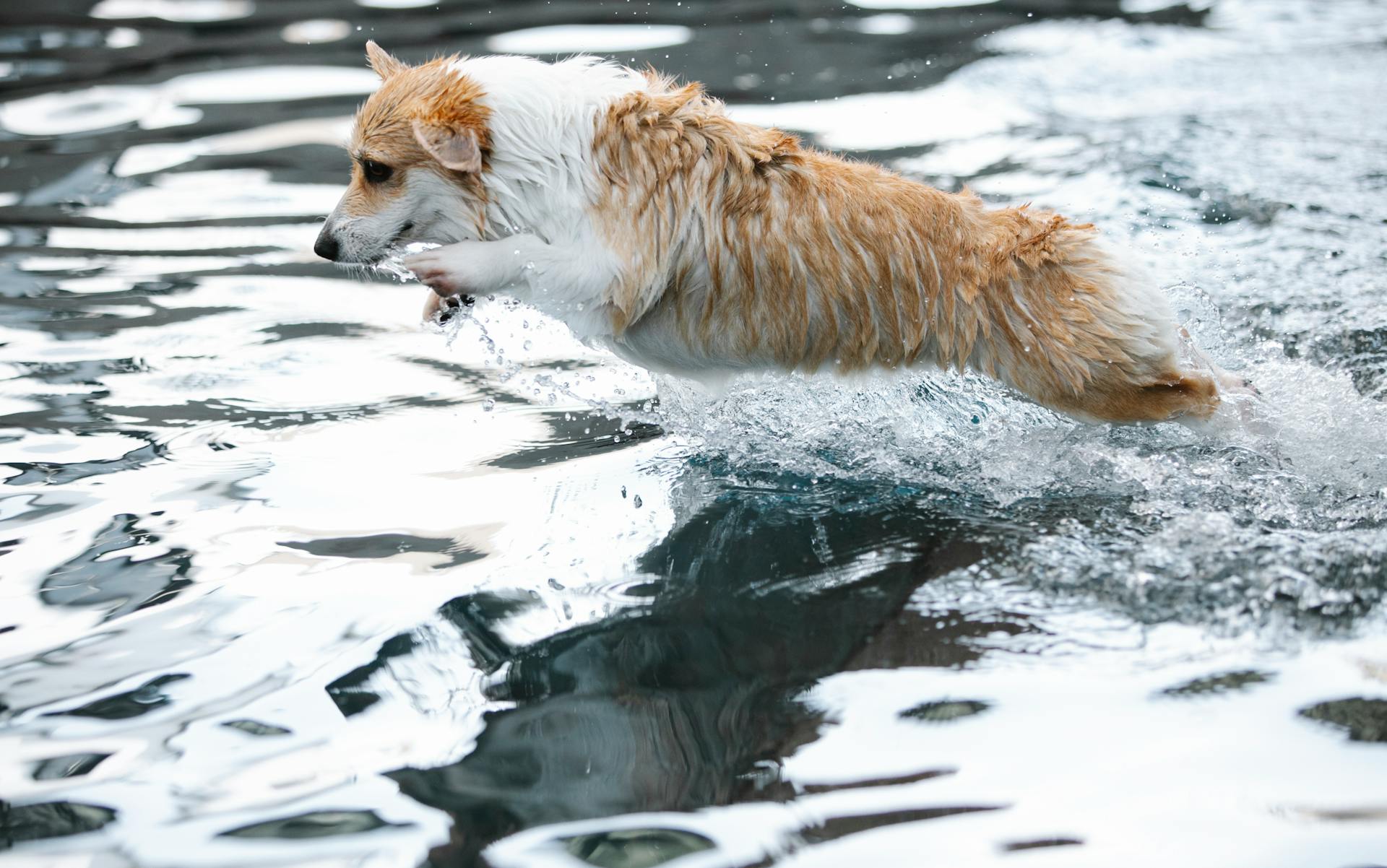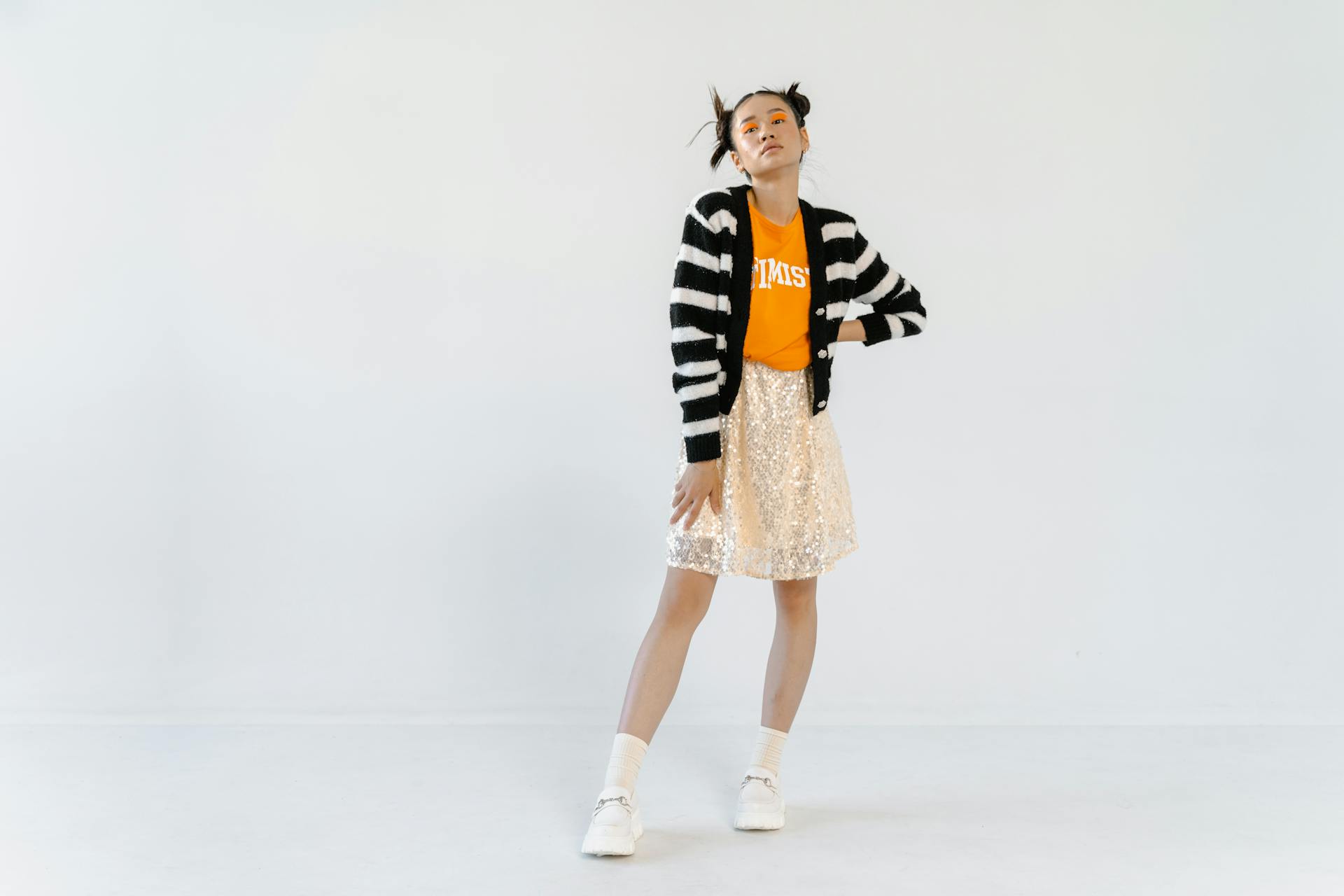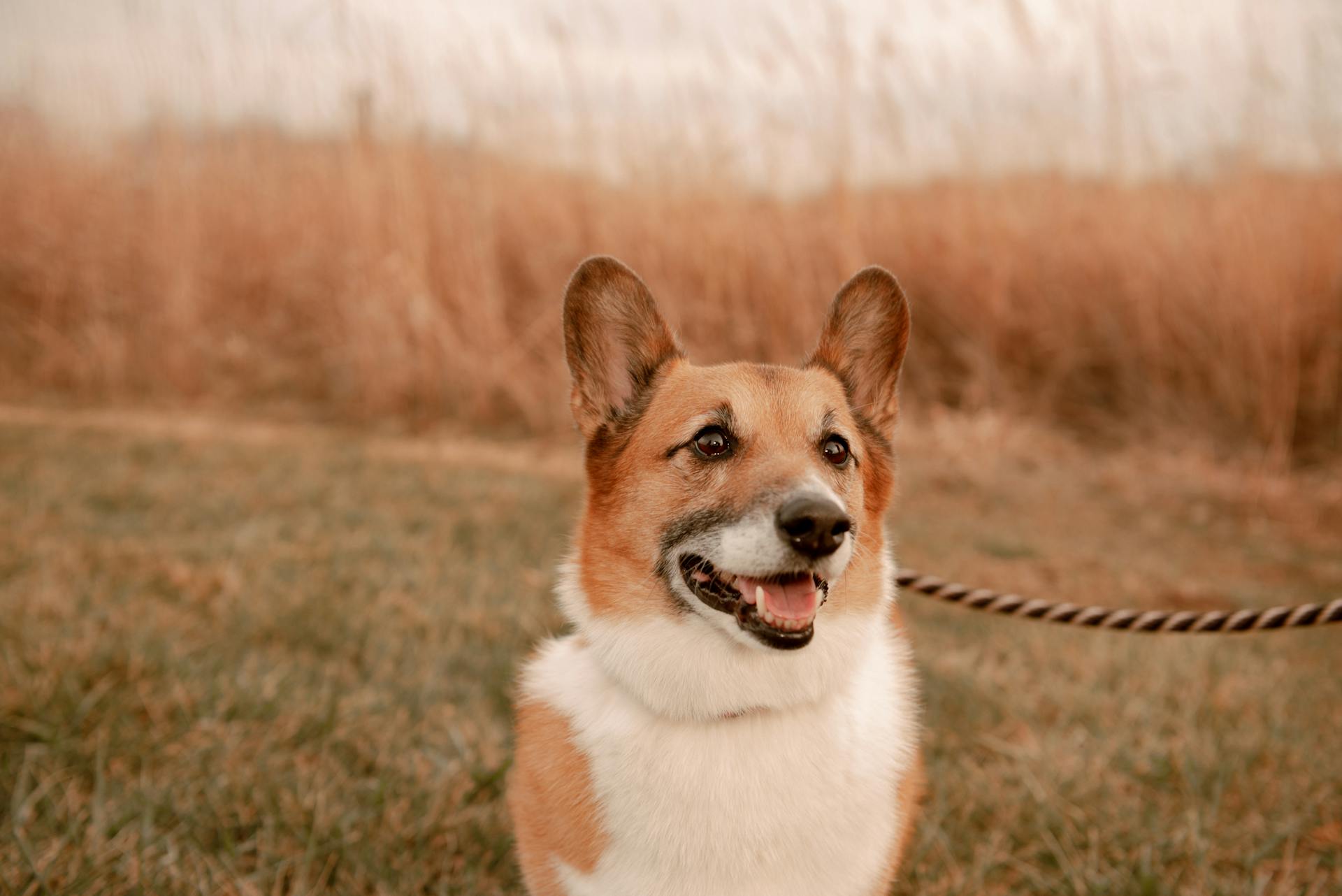
The Cardigan Welsh Corgi is a small but sturdy breed that requires regular exercise and a balanced diet to maintain a healthy weight.
They typically weigh between 25-38 pounds, with males being heavier than females.
To ensure your Cardigan Welsh Corgi stays within a healthy weight range, it's essential to monitor their food intake and adjust it accordingly.
Regular exercise, such as daily walks and playtime, is also crucial for maintaining a healthy weight and overall well-being.
Cardigan Welsh Corgis are prone to obesity, so it's crucial to keep an eye on their food portions and avoid overfeeding.
Aim to feed your Cardigan Welsh Corgi 2-3% of their body weight in food each day, divided into 2-3 meals.
With regular exercise and a balanced diet, your Cardigan Welsh Corgi can live a long and healthy life, free from weight-related issues.
You might enjoy: How Much Exercise Do Border Collies Need
Physical Characteristics
The Cardigan Welsh Corgi is a compact breed with a sturdy, low-set body. They typically stand between 10 to 13 inches tall at the withers.
One of the most distinctive features of the Cardigan is their long, bushy tail, which sets them apart from their Pembroke Welsh Corgi counterparts. They also have rounder ears compared to Pembrokes.
Cardigans usually weigh between 30 to 38 pounds for males and 25 to 34 pounds for females. This compact size makes them a great fit for apartment living, as long as they receive regular exercise.
Their double coat comes in a variety of colors, including red, sable, brindle, and blue merle, often with white markings. These colors can vary depending on the individual dog.
Here are the average height and weight ranges for Cardigans:
Care and Feeding
The Cardigan Welsh Corgi is a breed that requires regular exercise to stay happy and healthy. They need daily walks or training for dog sports like agility to keep them active.
Their low-slung body makes them prone to back injuries, so it's essential to avoid letting them jump on and off furniture, and to pick them up carefully. This means supporting both their front legs and rear end when lifting them.
Cardigans have a weather-resistant coat, but they're highly people-oriented and need regular human interaction. They shouldn't be left alone in the backyard with little attention.
To ensure your Cardigan eats the right amount of food, measure their daily intake with a cup or scale. Aim for 1 to 1.5 cups of high-quality dry food divided into two meals.
Keep an eye on their weight, as overfeeding can lead to back issues, hip dysplasia, and other health problems. Regular exercise and a balanced diet can help prevent these issues.
You should be able to see a waist when looking down at your Cardigan, and feel but not see their ribs when running your hands along their back. If you can't, they need less food and more exercise.
Cardigans love to eat, so it's crucial to monitor their food intake and not leave food out all the time. This will help keep them in good shape and prevent overindulgence.
A different take: When Will Shiba Inu Hit 1 Cent
Personality and Temperament
The Cardigan Welsh Corgi is a loyal and loving breed that thrives on family time. He's an adaptable companion who can live happily in big houses or small apartments.
This breed is extremely intelligent and athletic, making it perfect for playing games like fetch or agility courses. The Cardigan's high energy level requires regular exercise and mental stimulation.
The Cardigan is a responsible and alert watchdog who may be reserved towards strangers, so early socialization is crucial to ensure he grows up to be a well-rounded dog. He's a sturdy friend for children and makes a great companion for horse owners, who appreciate his assistance in loading horses into trailers.
Pembroke Variations
The Pembroke Welsh Corgi is known to be more outgoing than the Cardigan Welsh Corgi, especially with strangers.
They are highly intelligent and active, making them a fun-loving companion.
Their temperament can be influenced by their family history, so it's essential to learn about their ancestry.
The Pembroke's tail is usually docked if they are not born tailless, a characteristic that sets them apart from the Cardigan.
Their intelligence and energy level make them an excellent match for active families who can provide them with plenty of exercise and mental stimulation.
Overall, the Pembroke Welsh Corgi is a wonderful breed that can make a great companion for the right owner.
Personality and Temperament
The Cardigan Welsh Corgi is a family companion and show dog with an adaptable personality and responsible nature.
This breed is a sturdy friend for children, and his intelligence makes him highly trainable. However, he is an independent thinker and will often choose to do things his own way.
The Cardigan can be less sociable and more territorial than the Pembroke, and may be reserved toward strangers. He is an alert watchdog and may bark a warning at the sight, scent or sound of anything unusual.
Early socialization is crucial for this breed, ideally before four months of age. This helps to ensure that your Corgi puppy grows up to be a well-rounded dog.
The Cardigan is a fun loving dog with a loyal, loving, and even-tempered nature. He loves spending time with his family and is extremely adaptable.
This breed does very well with small children and other pets, and thoroughly enjoys having another dog to keep him company. Be sure to train your pup young and have him properly socialized.
The Cardigan is a very intelligent and athletic breed, so he will be happiest playing games such as fetch, or even agility courses.
Related reading: Water Loving Dogs for Short Nyt
Children and Pets
Cardigans love children, but their herding instincts can motivate them to nip at a youngster's feet or ankles.
Always supervise interactions between dogs and young children to prevent biting or ear or tail pulling on either party.
Teach children how to approach and touch dogs gently and respectfully.

No dog, no matter how friendly, should ever be left unsupervised with a child.
Cardigans are usually friendly toward other pets in the household, so long as they have been socialized with them.
They can be aggressive toward dogs that aren't part of their family, but they enjoy having a second or third dog in the family to play with, especially another Corgi.
Readers also liked: Are Border Collies Friendly
Health and Training
The Cardigan Welsh Corgi is a relatively healthy breed, but like all breeds, it's not immune to certain health issues. Intervertebral Disc Disease is a common problem in Cardigans, which can lead to back pain and mobility issues.
Regular check-ups with a veterinarian can help identify any potential health problems early on. Your vet may recommend eye exams, hip checks, and DNA testing for Progressive Retinal Atrophy (PRA) to ensure your Cardigan is healthy.
Cardigans are highly intelligent and thrive on positive reinforcement training. Start training your puppy from day one, and they'll quickly learn good manners and house rules. Gentle, positive training methods are very effective, and many Cardigans excel in activities like agility, flyball, obedience, and herding.
Here's an interesting read: Are Corgis Healthy
Health

The Cardigan Welsh Corgi is usually a very healthy breed, which is great news for potential owners.
However, like all breeds, they can be prone to certain health issues. Intervertebral Disc Disease is one of them, which can cause back problems in older dogs.
Progressive Retinal Atrophy is another issue that can affect Cardigan Welsh Corgis, leading to vision loss over time.
To ensure your Cardigan Welsh Corgi stays healthy, it's essential to keep an eye on their eye health. Regular eye check-ups can help detect any potential problems early on.
Hip health is also crucial for this breed, and hip evaluations can help identify any potential issues.
A DNA test for Progressive Retinal Atrophy (PRA) can also provide valuable information about your dog's genetic predisposition to this condition.
X-rays can help identify any potential spinal problems, such as those caused by Intervertebral Disc Disease.
Here are some key health tests to consider for your Cardigan Welsh Corgi:
- Eye evaluation
- Hip evaluation
- DNA test for PRA
- X-rays
Training

Training your Cardigan Welsh Corgi from day one is essential for a happy and well-behaved companion. Start training your puppy as soon as possible and you'll be amazed at how quickly they learn good manners and house rules.
Cardigan Welsh Corgis are intelligent dogs that naturally want to please you, making gentle and positive training methods very effective. This breed excels in various activities, including agility, flyball, obedience, and herding.
Frequently Asked Questions
Are Cardigan or Pembroke Corgis bigger?
Cardigan Corgis are generally bigger than Pembroke Corgis, weighing up to 8 pounds more due to their larger build. Despite being similar in height, size differences make Cardigans the heavier of the two breeds.
Featured Images: pexels.com


